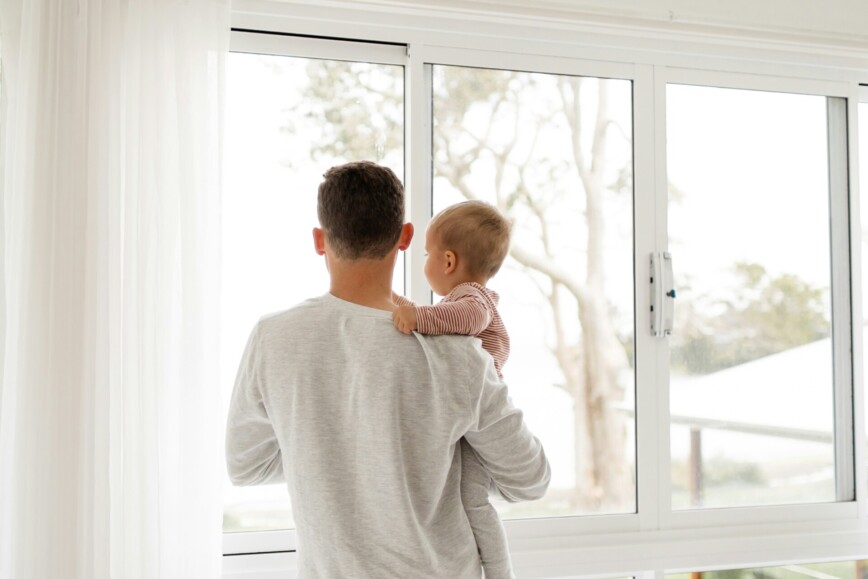Imagine a father and his young daughter building a pillow fort in the living room, their laughter filling the air as they create memories that will last a lifetime. These precious moments form the foundation of positive parenting.
I’ve witnessed countless fathers struggle with finding their parenting groove, wondering if they’re doing enough or doing it right. The truth is, being a positive parent isn’t about perfection – it’s about presence, patience, and genuine connection.
Research shows that fathers who practice positive parenting techniques have children who demonstrate higher emotional intelligence and stronger self-esteem. But what exactly does positive parenting look like in practice?
Think about the last time you really connected with your child. Was it during a bedtime story, a backyard adventure, or perhaps a quiet moment sharing ice cream? These simple interactions are powerful building blocks for lasting bonds.
Throughout this guide, we’ll explore practical strategies for creating a nurturing environment that fosters trust and understanding between you and your children.
The Changing Role of Fathers in Modern Parenting
Gone are the days when fathers were merely breadwinners who came home to read the evening paper. Today’s dads are rolling up their sleeves, changing diapers, and actively shaping their children’s emotional development.
Fatherhood has transformed profoundly. Modern fathers serve as nurturers, teachers, and emotional anchors for their children, extending far beyond their traditional role as providers.
Breaking Free from Traditional Stereotypes
The stoic, emotionally distant father figure is becoming obsolete. Contemporary dads openly show affection, express their feelings, and seek support when needed.
This shift reflects evolving societal expectations, supportive workplace policies, and deeper understanding of children’s developmental needs.
Research consistently shows that children with actively involved fathers perform better academically, develop stronger social skills, and demonstrate greater emotional resilience.
The modern father’s toolkit now includes skills once considered exclusively maternal – from managing school schedules to navigating emotional conversations with teenagers.
The Impact of Active Father Involvement
Let’s be clear: engaged fatherhood shapes children’s futures in profound ways.
When fathers actively participate in their children’s lives, they foster emotional development, academic achievement, and social adjustment.
I’ve observed how father involvement transforms both individual children and entire family dynamics, creating balanced, nurturing environments where both parents contribute meaningfully.
Consider this: children with engaged fathers develop higher self-esteem, better problem-solving skills, and stronger peer relationships.
The benefits of active fatherhood extend well beyond childhood, as these children often become emotionally intelligent adults who form healthier relationships.
Embracing New Parenting Dynamics
Modern fathers are equal partners who share decision-making responsibilities and emotional labor in parenting.
This evolution has created more balanced family dynamics, where both parents contribute their unique perspectives and strengths to child-rearing.
The beauty of modern fatherhood lies in its flexibility. Each father can develop his own parenting style while maintaining active engagement.
Technology enables working fathers to maintain meaningful connections with their children through video calls and messaging throughout the day.
These new dynamics foster stronger father-child bonds and create resilient family units capable of adapting to life’s challenges.
Building Strong Emotional Connections as a Father
The power of a father’s emotional presence shapes children’s lives in profound ways that science is only beginning to understand. When fathers actively engage in their children’s emotional world, they create lasting impacts that extend far beyond childhood.
Let’s be honest – many of us weren’t raised with fathers who freely expressed feelings or showed vulnerability. Breaking this cycle requires intention, courage, and a willingness to step outside our comfort zones.
Think about the moments that defined your relationship with your own father. Those experiences, whether positive or challenging, influence how you connect with your children today.
Creating Safe Spaces for Emotional Expression
Children need environments where they feel secure sharing their full range of emotions. As fathers, we create this safety through consistent emotional availability and non-judgmental responses to our children’s feelings.
Watch your child’s face light up when you put down your phone and give them your complete attention. These small moments of connection speak volumes about their importance in your life.
Practice active listening without immediately jumping to problem-solving mode. Sometimes children just need us to hear them out and validate their experiences, even if we can’t fix the situation.
Share appropriate stories about your own emotional journey, including times you’ve felt scared, sad, or uncertain. This vulnerability helps normalize emotional expression for your children.
Make it clear through both words and actions that there are no ‘bad’ emotions. Every feeling serves a purpose and deserves acknowledgment and understanding.
Building Daily Connection Rituals
Establish regular one-on-one time with each child where you engage in activities they choose. These special moments create space for natural conversations and emotional sharing.
Consider starting and ending each day with meaningful connection points – perhaps a morning check-in ritual or bedtime routine that includes sharing highlights and challenges.
Look for opportunities to express physical affection appropriately, whether through hugs, high-fives, or simply sitting close while reading together. Touch is a powerful communicator of care and acceptance.
Create family traditions that celebrate emotional milestones alongside physical ones. Acknowledge when your child shows emotional courage or growth.
Remember that consistency matters more than grand gestures. Small daily acts of emotional presence build trust and security over time.
Modeling Emotional Intelligence
Children learn emotional regulation primarily through observing their parents. When you handle your own emotions with awareness and care, you’re teaching valuable life skills.
Take responsibility for your emotional responses and apologize when you react poorly. This shows children that everyone makes mistakes and can learn from them.
Demonstrate healthy ways to manage stress and difficult feelings. Whether it’s taking deep breaths, going for a walk, or talking things through, let your children see your coping strategies in action.
Express joy, excitement, and love openly. Many fathers find it easier to show ‘positive’ emotions, so start there and gradually expand your emotional expression.
Remember that being emotionally available doesn’t mean being perfect. It means being authentic, present, and committed to growing alongside your children.
Balancing Discipline and Nurture in Positive Fatherhood

As fathers, we have a unique opportunity to model what healthy discipline looks like. Our children need to see that rules and love can coexist beautifully.
Setting Boundaries with Love and Respect
Clear boundaries help children feel secure, but the way we establish them matters immensely. A gentle yet firm approach teaches children that limits come from a place of care, not control.
When setting rules, remember to explain the ‘why’ behind them. This helps children understand the purpose of boundaries rather than simply following directions.
Consistency is essential. Children thrive when they know what to expect, so establish routines and maintain them while remaining flexible enough to adapt when needed.
Nurturing Through Positive Reinforcement
Positive discipline isn’t about avoiding consequences – it’s about focusing more on what children do right than what they do wrong. Acknowledge specific instances of good behavior.
Consider each disciplinary moment as a teaching opportunity. Instead of just saying ‘no,’ guide your child toward understanding better choices.
Build trust by staying calm during challenging moments. Your steady presence teaches emotional regulation far more effectively than reactive discipline.
Remember that discipline is most effective when it comes from a place of genuine connection. Take time to really listen to your children and understand their perspective.
Finding Your Balance
The balance between discipline and nurture looks different for every family. What works for one child might not work for another, even within the same household.
Pay attention to your child’s unique personality and needs. Some children require more structure, while others thrive with more flexibility.
Trust your instincts while remaining open to learning and adjusting your approach. Parenting is a journey of constant growth and adaptation.
When you make mistakes (and we all do), use them as opportunities to model accountability. Apologize when needed and show your children that learning from mistakes is part of growing.
Focus on building a relationship that will last long after your children have grown. The discipline strategies you use today shape tomorrow’s adults.
Implementing Positive Parenting Strategies
Effective parenting strategies significantly impact child development and family dynamics. Fathers can implement various techniques to balance discipline with nurture, fostering growth and mutual respect within the family unit.
The Impact of Positive Fathering on Child Development
Positive fathering fundamentally shapes a child’s developmental journey, creating lasting effects that extend far beyond the early years. As a father of three, I’ve witnessed firsthand how consistent, nurturing engagement transforms young minds and hearts.
The profound influence of involved fathers manifests in children’s enhanced cognitive capabilities, particularly during critical developmental stages. Research demonstrates that children with actively engaged fathers display superior problem-solving abilities and creative thinking skills.
When fathers actively participate in their children’s lives, they establish a secure emotional foundation that supports healthy development. This emotional security proves especially vital during challenging times, helping children build resilience and adaptability.
Cognitive Development and Academic Success
Children with involved fathers demonstrate enhanced cognitive abilities that translate into academic excellence. These benefits emerge early and continue throughout their educational journey.
A father’s engagement in educational activities, from reading bedtime stories to helping with homework, fosters a powerful learning environment. Such involvement communicates the inherent value of education and intellectual curiosity.
The cognitive advantages extend beyond traditional academic measures. Children with involved fathers develop improved language skills, stronger analytical capabilities, and enhanced problem-solving abilities.
Emotional Regulation and Social Skills
Children’s emotional intelligence significantly improves with active paternal participation in their upbringing. This emotional foundation becomes essential for developing healthy relationships later in life.
Through positive fathering, children learn effective ways to manage their emotions and navigate social situations. These skills become invaluable in both personal and professional contexts as they grow older.
The security of a strong father-child bond enables children to explore their world with confidence. This emotional safety net encourages them to take calculated risks and learn from their experiences.
Quality father-child interactions foster crucial lessons about empathy, respect, and understanding. These fundamental social skills shape how children interact with peers and authority figures throughout their lives.
The impact of positive fathering extends into adolescence and adulthood, influencing everything from self-esteem to relationship choices. Children who experience consistent paternal support develop stronger communication skills and healthier boundaries.
Long-term Benefits and Overall Well-being
The positive effects of engaged fathering create a lasting legacy that shapes future generations. Children raised with involved fathers become more confident and emotionally stable adults.
Research shows that children with actively involved fathers demonstrate higher levels of self-esteem and self-worth. These internal resources serve as crucial assets in navigating life’s challenges.
The influence of positive fathering extends into career success and professional relationships. Children who experience supportive fathering develop stronger leadership skills and work ethics.
Perhaps most significantly, children of involved fathers often become better parents themselves. They perpetuate the positive parenting patterns they experienced, creating a cycle of healthy family dynamics.
While every child’s journey is unique, the presence of an engaged father provides an invaluable foundation for lifelong success and well-being. The investment in positive fathering yields returns that span generations.
Overcoming Challenges in Positive Parenting

Balancing fatherhood with life’s demands often feels like walking a tightrope while juggling competing priorities. The pressure to excel both at work and home can be overwhelming.
Work deadlines clash with soccer practices, and society’s expectations weigh heavily on our shoulders. We face the dual challenge of being both the traditional provider and the modern, emotionally available dad.
Let’s be honest – there are days when self-doubt creeps in. Am I spending enough quality time? Am I being consistent with my parenting approach? These questions are natural, and acknowledging them is the first step toward growth.
Breaking Free from Traditional Expectations
The old stereotype of fathers as distant disciplinarians doesn’t serve modern families well. Today’s dads need to embrace both strength and sensitivity, finding their authentic parenting voice.
Many of us grew up with fathers who showed love through provision rather than presence. Now, we’re learning to express emotions openly while maintaining healthy boundaries.
Cultural shifts have expanded our role beyond breadwinner to include nurturing, emotional support, and active involvement in daily childcare. This evolution brings both challenges and opportunities.
Mastering Work-Life Integration
The myth of perfect work-life balance needs reexamining. Instead, focus on work-life integration – finding practical ways to blend professional responsibilities with family time.
Consider establishing ‘sacred’ family times that remain protected regardless of work demands. Early morning playtime or bedtime stories can become non-negotiable rituals.
Technology can be both friend and foe. Use it purposefully to maximize efficiency at work, creating more space for quality family interactions.
Small, consistent moments matter more than grand gestures. A quick video call during lunch break or helping with homework via FaceTime shows your children they’re always a priority.
Remember that your presence, even if imperfect, matters more than perfection. Children need authentic connection more than picture-perfect parenting.
Building Your Support Network
Seeking support isn’t a sign of weakness – it’s a strategy for success. Connect with other fathers facing similar challenges through local parenting groups or online communities.
Be open with your partner about struggles and victories. Clear communication helps create a united front in parenting decisions.
Don’t hesitate to seek professional guidance when needed. Parent coaching or counseling can provide valuable tools and perspectives.
Share childcare responsibilities with trusted family members or friends. This creates breathing room for self-care and relationship nurturing.
Remember that investing in your own well-being directly impacts your effectiveness as a father. Taking time to recharge isn’t selfish – it’s essential.
Embracing Positive Fatherhood for Lasting Family Happiness
The journey of positive fatherhood represents a profound opportunity to shape the future of our families. Research from the US Department of Health and Human Services shows that children with involved fathers are 43% more likely to earn mostly As in school and demonstrate stronger cognitive development.
Active father involvement during a child’s early years establishes lifelong emotional bonds. Through shared daily moments like bedtime routines and playful activities, these interactions build trust and security that benefit both father and child.
The quality of time spent together matters more than quantity. Simple acts such as active listening, showing affection, and being fully present create lasting positive impacts on children’s development and well-being.
Building mutual respect and open communication helps fathers forge deeper connections with their children. When fathers treat their children’s thoughts and emotions with genuine consideration, they demonstrate that their children’s perspectives are valued.
The rewards of positive fatherhood extend far beyond childhood. Children with engaged fathers develop better self-esteem, achieve stronger academic performance, and build healthier relationships in their adult lives, creating a legacy of positive parenting that spans generations.





